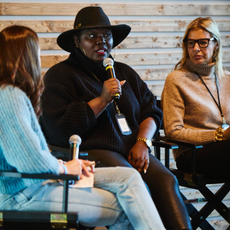
Welcome to MarieClaire.com's brand-new job advice column courtesy of career coach Liz Bentley—check back often for her whip-smart real-world wisdom. Have questions of your own? Send them to careeradvice@marieclaire.com to get them answered right here.
Dear Liz: I’ve been in the same job for years and I hate it. It’s too junior for me and I’m not making enough money. But every time I try to find a new job, I get too anxious about the process to actually do anything. It just seems so hopeless since every time I apply for a job through a listing, I never hear back. Help! — R.L., 27
Dear R.L.: We run into this challenge a lot; people are unhappy in their jobs and hope the grass is greener somewhere else. The good news is that sometimes it is; the bad news is that sometimes it’s not and even if it is greener, it’s not always easy to get there. So let’s design a good road map for you to tackle this problem and drive toward a successful outcome.
"No matter how well you think you may disguise your feelings of dissatisfaction, they are likely felt through your energy and actions."
First, look internally. The job you have is often easier to work than the job you don’t, so look to advance in your present company before you look elsewhere. In your current position, your boss and colleagues know you. They know your strengths and how to use you in the company. Here’s a promotion checklist for you to consider:
Even if you think you do not like the company or the boss, it tends to be easier to move up first before you move out. By moving up first, you’ll have more leverage externally in both position and income and will be less likely to make a lateral move.
Additionally, addressing the above checklist will get you promotion-ready. Reviewing wins and strengths will prep you for interviews and job placement. In considering your relationship with your managers, you can address what you have done well in managing up and what you have not. Remember bosses often influence promotions and pay, so it’s important to prove your worth to them.
And I can’t say this enough—getting "real" feedback is critical to all career growth. There is a possibility that your lack of advancement and pay may be of your own doing. If you are going to leave this company, you want to leave your mistakes and bad habits behind so that you do not recreate the same issues somewhere else and sabotage your next job.
Stay In The Know
Marie Claire email subscribers get intel on fashion and beauty trends, hot-off-the-press celebrity news, and more. Sign up here.
While you are working on your promotion checklist, you also need to work the other side of the fence—an external job. Strategies for looking externally are:
1. Get your resume up to snuff. There are plenty of great samples and advice online. Here are the 3 key ingredients your resume needs. It should:
At a glance, someone should be able to "get you" right off the bat.
2. Target companies. Where do you want to work? Target the companies where you would like to work and look up HR directors, work your network to see who you know there, and look for connections. If the company is a reach because it has a hard point of entry, make it a goal to get there eventually even if you don’t make it in this round.
3. Network. Get out and tell people you are looking. Be discreet of course, so that you do not offend your current employer but find out what’s out there, who is hiring, and the market climate for your position and career.
4. Stand out. If you do write an email to someone you don’t know through LinkedIn, a job posting, or a company contact, be sure to stand out. Make your email interesting, short and to the point. Realize that people get solicited all the time through email so you are going to have to cut through the noise to make it work.
Looking for a job can be stressful. It’s common to become overwhelmed, intimidated and sometimes even defeated by the search process. But staying in your current job and settling for mediocrity is worse.
It’s Critical To Get Back Into Flow
If you are no longer challenged by your work, it is very important to get back in the game and get into “flow.” A state of flow is described in positive psychology as immersion in an activity. It occurs when your skills and challenges are perfectly aligned, making time move quickly and getting you fully absorbed in your work and enjoying it. When you are in a state of flow, your performance goes up. When you are not, inevitably your performance goes down, as does your attitude. No matter how well you think you may disguise your feelings of dissatisfaction, they are likely felt through your energy and actions by your coworkers and boss.
To get back into flow, you will have to get uncomfortable. You’ll need to stretch yourself by learning new skills and making attitude/mindset adjustments to operate well on the next level.
RELATED STORIES



Have the courage to make change, first in your commitment to chase flow knowing that that will lead to a more satisfying life. Then have courage to follow the road map of career advancement by playing both sides of the fence—do the internal checklist and the external job hunt—at the same time.
You control your outcome. While the world around you may impact and influence you, *your job* is to impact and influence the world. If you want to get ahead, make the choice to take control of your life and make a positive change. Although it may be hard, anything is possible and everything is probable with hard work and process examination. Be resilient, take it one step at a time, and have faith in yourself. And keep going back to the drawing board until you get what you want.
Liz Bentley is the founder of Liz Bentley Associates, a consulting firm specializing in leadership development programs for individuals and companies. Drawing upon her background in psychology, previous experience in sales and management, and a lifetime of experience in competitive sports, Liz has a unique appreciation of mindset and the power it has to change patterns of behavior. Liz received her BA in Psychology from the University of Virginia and her coaching certification from New York University.
-
 Dakota Johnson Test-Drives Gen-Z's Favorite Outfit Formula
Dakota Johnson Test-Drives Gen-Z's Favorite Outfit FormulaThe actress put a sophisticated spin on the tiny top, big pants combination.
By Julia Gray Published
-
 Flower Crowns Won’t Be the Only Beauty Trend on the Met Gala Red Carpet
Flower Crowns Won’t Be the Only Beauty Trend on the Met Gala Red CarpetAccording to the pros, “The Garden of Time” dress code will bring pearl embellishments, period hair, and textured tree-inspired nail art.
By Samantha Holender Published
-
 Bella Hadid Designed Perfume We Can Play With
Bella Hadid Designed Perfume We Can Play WithÔrebella's shake-to-activate scents were made to be TikToked.
By Halie LeSavage Last updated
-
 Peloton’s Selena Samuela on Turning Tragedy Into Strength
Peloton’s Selena Samuela on Turning Tragedy Into StrengthBefore becoming a powerhouse cycling instructor, Selena Samuela was an immigrant trying to adjust to new environments and new versions of herself.
By Emily Tisch Sussman Published
-
 This Mutual Fund Firm Is Helping to Create a More Sustainable Future
This Mutual Fund Firm Is Helping to Create a More Sustainable FutureAmy Domini and her firm, Domini Impact Investments LLC, are inspiring a greater and greener world—one investor at a time.
By Sponsored Published
-
 Power Players Build on Success
Power Players Build on Success"The New Normal" left some brands stronger than ever. We asked then what lies ahead.
By Maria Ricapito Published
-
 Don't Stress! You Can Get in Good Shape Money-wise
Don't Stress! You Can Get in Good Shape Money-wiseYes, maybe you eat paleo and have mastered crow pose, but do you practice financial wellness?
By Sallie Krawcheck Published
-
 The Book Club Revolution
The Book Club RevolutionLots of women are voracious readers. Other women are capitalizing on that.
By Lily Herman Published
-
 The Future of Women and Work
The Future of Women and WorkThe pandemic has completely upended how we do our jobs. This is Marie Claire's guide to navigating your career in a COVID-19 world.
By Megan DiTrolio Published
-
 Black-Owned Coworking Spaces Are Providing a Safe Haven for POC
Black-Owned Coworking Spaces Are Providing a Safe Haven for POCFor people of color, many of whom prefer to WFH, inclusive coworking spaces don't just offer a place to work—they cultivate community.
By Megan DiTrolio Published
-
 Where Did All My Work Friends Go?
Where Did All My Work Friends Go?The pandemic has forced our work friendships to evolve. Will they ever be the same?
By Rachel Epstein Published